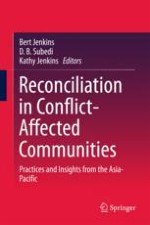2018 | OriginalPaper | Buchkapitel
6. Sri Lanka’s Developmental Path to Reconciliation: Narratives and Counter-Narratives from the Margins
verfasst von : D. B. Subedi, Frances Bulathsinghala
Erschienen in: Reconciliation in Conflict-Affected Communities
Verlag: Springer Singapore
Aktivieren Sie unsere intelligente Suche, um passende Fachinhalte oder Patente zu finden.
Wählen Sie Textabschnitte aus um mit Künstlicher Intelligenz passenden Patente zu finden. powered by
Markieren Sie Textabschnitte, um KI-gestützt weitere passende Inhalte zu finden. powered by
